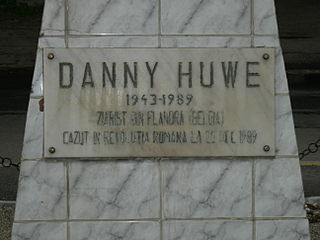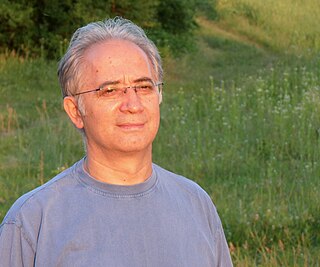This is a bibliography of works about the Romanian Revolution.
The Romanian Revolution was a series of riots and clashes in December 1989. These were part of the Revolutions of 1989 that occurred in several Warsaw Pact countries. The Romanian Revolution was the only one of these revolutions where a Communist government was violently overthrown and the country's leader was executed.

Timișoara is the capital city of Timiș County and the main economic, social and cultural center in western Romania. Located on the Bega River, Timișoara is considered the informal capital city of the historical Banat. From 1848 to 1860 it was the capital of the Serbian Vojvodina and the Voivodeship of Serbia and Banat of Temeschwar.

László Tőkés is an ethnic Hungarian pastor and politician from Romania. He was a Member of the European Parliament (MEP) from 2007 to 2019. He served as a Vice-President of the European Parliament from 2010 to 2012.

The Romanian Revolution was a period of violent civil unrest in Romania during December 1989 as a part of the Revolutions of 1989 that occurred in several countries. The Romanian Revolution started in the city of Timișoara and soon spread throughout the country, ultimately culminating in the show trial and execution of longtime Communist Party General Secretary Nicolae Ceaușescu and his wife Elena, and the end of 42 years of Communist rule in Romania. It was also the last removal of a Marxist-Leninist government in a Warsaw Pact country during the events of 1989, and the only one that violently overthrew a country's leadership and executed its ruler.
Paul Goma was a Romanian writer, known for his activities as a dissident and leading opponent of the communist regime before 1989. Forced into exile by the communist authorities, he became a political refugee and resided in France as a stateless person. After 2000, Goma has expressed opinions on World War II, the Holocaust in Romania and the Jews, claims which have led to widespread allegations of antisemitism.

Ion Horia Leonida Caramitru is a Romanian stage and film actor, stage director and political figure. He was Minister of Culture between 1996 and 2000, in the Romanian Democratic Convention (CDR) cabinets of Victor Ciorbea, Gavril Dejeu, Radu Vasile, Alexandru Athanasiu, and Mugur Isărescu. Is married with actress Micaela Caracaș and has three sons: Ștefan, Andrei, and Matei Caramitru.
Iorgu Iordan was a Romanian linguist, philologist, diplomat, journalist, and left-wing agrarian, later communist, politician. The author of works on a large variety of topics, most of them dealing with issues of the Romanian language and Romance languages in general, he was elected a full member of the Romanian Academy in 1945. He was head of its Institute of Linguistics between 1949 and his retirement in 1962.

Eftimie Murgu was a Romanian philosopher and politician who took part in the 1848 Revolutions.
Alexandru Zub is a Romanian historian, biographer, essayist, political activist and academic. A former Professor at the University of Iași, noted for his contribution to the study of cultural history and Romanian history, he is currently head of the A.D. Xenopol Institute of History. He was elected a full member of the Romanian Academy in 2004 ; currently, he serves as head of the Academy's History Department.
Revolution Square is a square in central Bucharest, on Calea Victoriei. Known as Piața Palatului until 1989, it was later renamed after the Romanian Revolution of December 1989. The former Royal Palace, the Athenaeum, the Athénée Palace Hotel, the University of Bucharest Library and the Memorial of Rebirth are located here. The square also houses the building of the former Central Committee of the Romanian Communist Party. In 1990, the building became the seat of the Senate and since 2006 it houses the Ministry of Interior and Administrative Reform.
Marin Ceaușescu was a Romanian economist and diplomat, the older brother of Communist Romania's President Nicolae Ceaușescu.
Camil Bujor Mureşanu was a Romanian historian, professor, author, and translator.

Danny Huwé was a Belgian journalist who was working for VTM, Vlaamse Televisie Maatschappij, at the time of his death. Before VTM he worked as a radio journalist at the BRT for many years together with journalists such as Rudi Dufour, Rudi Vranckx, Mark Ooms, and Piet Deslé. He was killed during the Romanian Revolution.

Horia Hulubei was a Romanian nuclear physicist, known for his contributions to the development of X-ray spectroscopy.

Gabriel Andreescu is a Romanian human rights activist and political scientist born on 8 April 1952 in Buzău. He is one of the few Romanian dissidents who openly opposed Nicolae Ceaușescu and the Communist regime in Romania.
Vasile Tărâţeanu is an ethnic Romanian writer and activist from Ukraine.

Parliamentary elections were held in the Socialist Republic of Romania on 17 March 1985. The Front of Socialist Unity and Democracy (FDUS), dominated by the Romanian Communist Party (PCR) and including other mass organisations, was the only group to contest the elections, and no prospective candidate could run for office without the Front's approval. Consequently, FDUS candidates won all 369 seats in the Great National Assembly, also ensuring the rubber-stamp confirmation of Nicolae Ceaușescu as President of Romania. The Assembly which elected him included several members of the Ceaușescu family, namely his wife Elena, son Nicu, and brother Ilie. Continuity was also ensured by other incumbents, including Nicolae Giosan as Assembly chairman and Constantin Dăscălescu as Prime Minister.

Ionuț Caragea is a Romanian writer living in Oradea, România. Romanian literary critics see him as one of the leaders of the 2000 poetic generation and one of the most atypical and original writers of today's Romania. He is also known in France, where he has been published several books translated or written directly into French, thus becoming a member of the Société des Poètes Français and a member of the Société des poètes et artistes de France. Academician Giovanni Dotoli, one of the leading personalities of Francophonie, analyzing the volume of poems "Mon amour abyssal", considers that Ionuț Caragea is a poet who honors Romania and European literature. Ionuț Caragea was twice awarded by the Society of French Poets, the oldest and most prestigious poetry society in France. "Mon amour abyssal" won the "François-Victor Hugo" award and "J'habite la maison aux fenêtres fermées" won the "Mompezat" award.

The 2015 Romanian protests began on 3 November, when more than 15,000 people protested in front of Victoria Palace—the headquarters of the Romanian government—blocking traffic in Victory Square.

Victor Spinei is Emeritus Professor of history and archaeology at the Alexandru Ioan Cuza University, member and vice president of the Romanian Academy. He is a specialist on the history of Romania and the Romanian people in the Early and High Middle Ages, the history of migratory peoples in Eastern and Southeastern Europe during this period, and the production and circulation of cult objects in Eastern and Southeastern Europe during the Middle Ages.

Dumitru Mazilu is a Romanian politician. He had a key role in the events of the Romanian Revolution of December 1989 and in exposing the human rights abuses of the Ceaușescu regime.